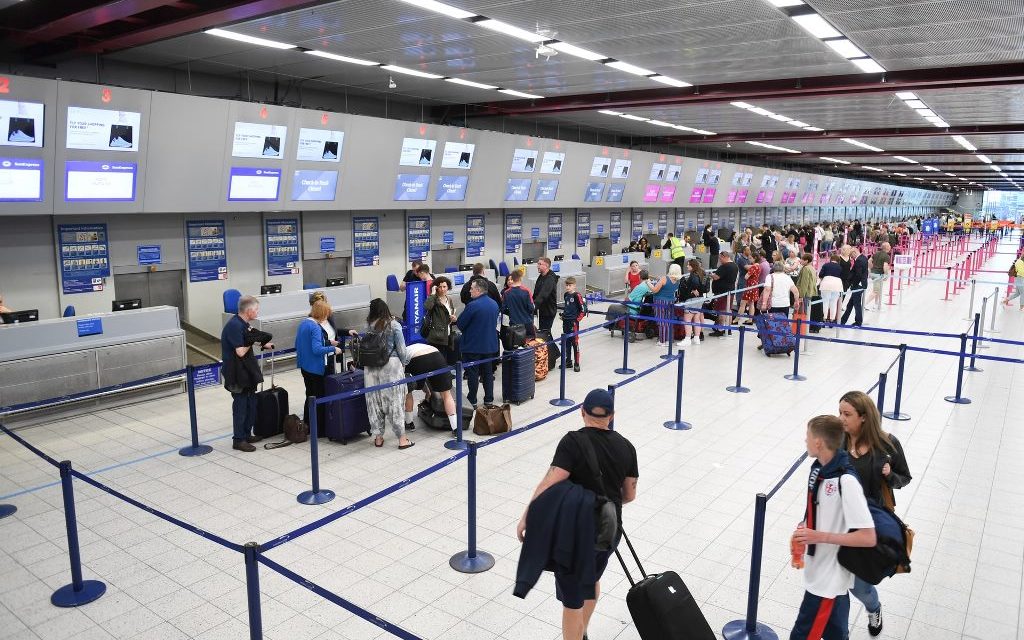New Delhi – According to the study published by Astute Analytica, the Global Smart Airport Market is estimated to witness a major rise in its revenue from US$ 29,463.1 Mn in 2021 to US$ 54,862.0 Mn by 2027. The market is registering a CAGR of 10.9% during the forecast period.
Smart airports use advanced technologies such as cyber security, intelligent building management, Internet of Things (IoT), GPS and sensor, Artificial Intelligence (AI), and blockchain among others to improve airport processing and information efficiency. For instance, in 2019, the U.S. Transportation Security Administration used AI to help target threats, at Los Angeles International Airport, John F. Kennedy, and Phoenix airports.
Drivers:
The growing impetus of the market is attributed to factors such as growth of air-travel and tourism industry, increase in passenger and cargo traffic, rising rate in development of smart cities, increasing investment in the development/ augmentation of airports, and technological advancements leading to process optimization. The growth of air travel and tourism industry has been one of the most prominent socio-economic phenomena of the post-financial crisis (in 2008) years. Further, the current issues faced by commercial airports are managing large cargo capacity with conventional technological systems, and aging aircraft fleets which are delaying the deliveries and are limiting the quality of the services. In response to aging aircraft fleets, technological obsolescence, and volatility in fuel prices, the demand for smart airports has increased for both commercial and leisure purposes.
Presently, 4.5 billion passengers are carried by scheduled international airlines and this figure is estimated to double before the end of 2030. Moreover, the tourism sector in many countries of the world is profoundly shaped by the continual development of air services. Further, the advances in aircraft technology, enhancements in information and communications technology (ICT), and marketing strategies have improved the quality of air travel, which has doubled the number of tourist arrivals in the world, thereby propelling the market growth. Most smart airports are utilizing smart city services to enable intelligent administrations to design and install smart parking, smart retail, and smart workplace services, allowing efficient management effortlessly.
Restraints:
Rising usage of smart services exposes a broad range of vulnerabilities that can be manipulated by cybercriminals and other malicious activities, this is posing major threat to the growth of the market. In 2019, the World Economic Forum (WEF) estimated that cyber-attacks are the top five risks to global stability and security. In addition, as per Identity Theft Resource Centers data, the number of data breaches observed in 2018 is around 1,257 and it increased to almost 1,473 in 2019. Thus, the presence of various security concerns associated with smart airport systems is the prime factor hindering the growth of the smart airport market.
Segmental Analysis
The various segments considered to analyze the global smart airport market are based on infrastructure, application, solutions, services, airport model, airport size, airport operation, and region. Based on infrastructure; passenger, cargo, and baggage ground handling control segment hold the highest market share in 2021. In terms of solutions, terminal side dominates the smart airports market in 2021. Further, based on application, the business applications hold the highest market share in 2021 and are further registering the highest CAGR over the forecast period. In addition, based on services, smart transport and parking services leads the market in 2021. Moreover, in terms of airport operation, commercial service airports hold the highest market share in 2021. North America dominates the global smart airports market in 2021.
Global Smart Airport Market by Region
North America is the highest shareholder region with a share of 35.3% in the global smart airport market in 2021. This is due to the large-scale investments made by governments for optimizing operations at the airport coupled with the implementation of IoT, AI, and Big Data in airport operations which has the feasibility to improve visibility and optimize business process. Moreover, the rising preference for improving personalized experience, and higher concentration of the market players is expected to propel the market growth over the forecast period. Further, Asia-Pacific is estimated to grow at the highest CAGR of 14% during the forecast period, with a market share of 25% in the global smart airport market in the year 2021. Rising disposable income and growing tourism industry in the Asia Pacific countries is driving market growth.
Impact of COVID-19 on the Global Smart Airport Market
The covid-19 pandemic adversely affected the whole tourism industry. As per the ICAO, total number of domestic and international flights for the passenger and cargo transport accounted for 432,502 in March 2020, which is a decline from 693,961 in March 2019. After the exponential increase in COVID-19 cases across the world, an immediate and complete ban was imposed on all domestic and international flights to avoid any further spread of infection, this restricted the market growth. In addition to this, the visa on arrival was also canceled by various countries of Asia-Pacific. However, as the world is getting back to normal, the number of passengers traveling is also rising, which in turn is expected to fuel the market growth during the post COVID times.
Segmentation Overview
By Infrastructure segment of the Global Smart Airport Market is sub-segmented into:
- Endpoint Devices
- Sensors
- Tags
- IP Phone
- Video Conferencing (Audio/ Video)
- Communication Systems
- Wireless Airports
- Smart Phones
- Near Field Communication
- Social Media
- Passenger, Cargo, and Baggage Ground Handling Control
- IoT Enabled Beacons
- Robots for Passenger and Baggage Movement
- Common-use Self-service (CUSS) Kiosks
- RFID Baggage Reconciliation System
- E-Gates
- Air/Ground Traffic Control
- Smart Systems & Scalable Air Traffic Management Solutions (ATM)
- Automated Passport Controls
- Security Systems
- Biometrics
- Alerts & Cyber Security
- E-Fence & Ground Surveillance Radar
- E-Tag System
- Others (Navigational, Landing Aids, Digital Signage, Airport Management Software)
By Solutions segment of the Global Smart Airport Market is sub-segmented into:
- Terminal Side
- HVAC
- Lighting Control
- Digital Video Surveillance and Management (DVM)
- Fire and Life Safety Solutions
- Energy Management
- Life Cycle Services
- Building Management and Automation Systems
- Air Side
- Advanced Visual Docking Guidance System (A-VDGS)
- Airfield Ground Lighting (AGL)
- Surface Movement Guidance
- Runway Improvement and Apron Management
- Digital and Radar Video Surveillance
- Landside
- Parking
- Access Roads
- Perimeter Security
- Car Rental
- Mass Transit
- Airport City
By Application segment of the Global Smart Airport Market is sub-segmented into:
- Core Applications
- Content Management
- Business Intelligence
- Next-Generation Web
- Collaboration
- Integration
- Business Applications
- Noise Abatement
- Fee Management
- Performance Management
- Gate Management
By Services segment of the Global Smart Airport Market is sub-segmented into:
- Smart Transport & Parking Services
- Real-time Travel Services
- Intelligent Transport Services
- Trip Concierge
- Smart Retail, Hospitality & Entertainment Services
- Passenger-Specific Retail and Hospitality
- Intelligent Advertising
- Lean Retail Solutions
- Telepresence Rooms
- Smart Workplace Services
- Equipment Telematics Solutions
- Mobile Worker and Expert Locator
- Smart Airport Processes
- Location-Based Services
- RFID Baggage Tagging
- No-queue Check-in Solutions
- Smart Business to Business Services
- Traffic and Facilities Management
- Smart Supply-Chain and MRO Services
By Airport Model segment of the Global Smart Airport Market is sub-segmented into:
- Airport 2.0
- Airport 3.0
- Airport 4.0
By Airport Size segment of the Global Smart Airport Market is sub-segmented into:
- Small
- Medium
- Large
By Airport Operation segment of the Global Smart Airport Market is sub-segmented into:
- Commercial Service Airports
- Cargo Service Airports
- General Aviation Airports
By Region segment of the Global Smart Airport Market is sub-segmented into:
- North America
- The U.S.
- Canada
- Mexico
- Europe
- The UK
- Germany
- France
- Italy
- Spain
- Poland
- Russia
- Rest of Europe
- Asia Pacific
- China
- Taiwan
- India
- Japan
- Australia & New Zealand
- ASEAN
- Rest of Asia Pacific
- Middle East & Africa (MEA)
- UAE
- Saudi Arabia
- South Africa
- Rest of MEA
- South America
- Brazil
- Argentina
- Rest of South America
Source: AstuteAnalytica India Pvt. Ltd.





